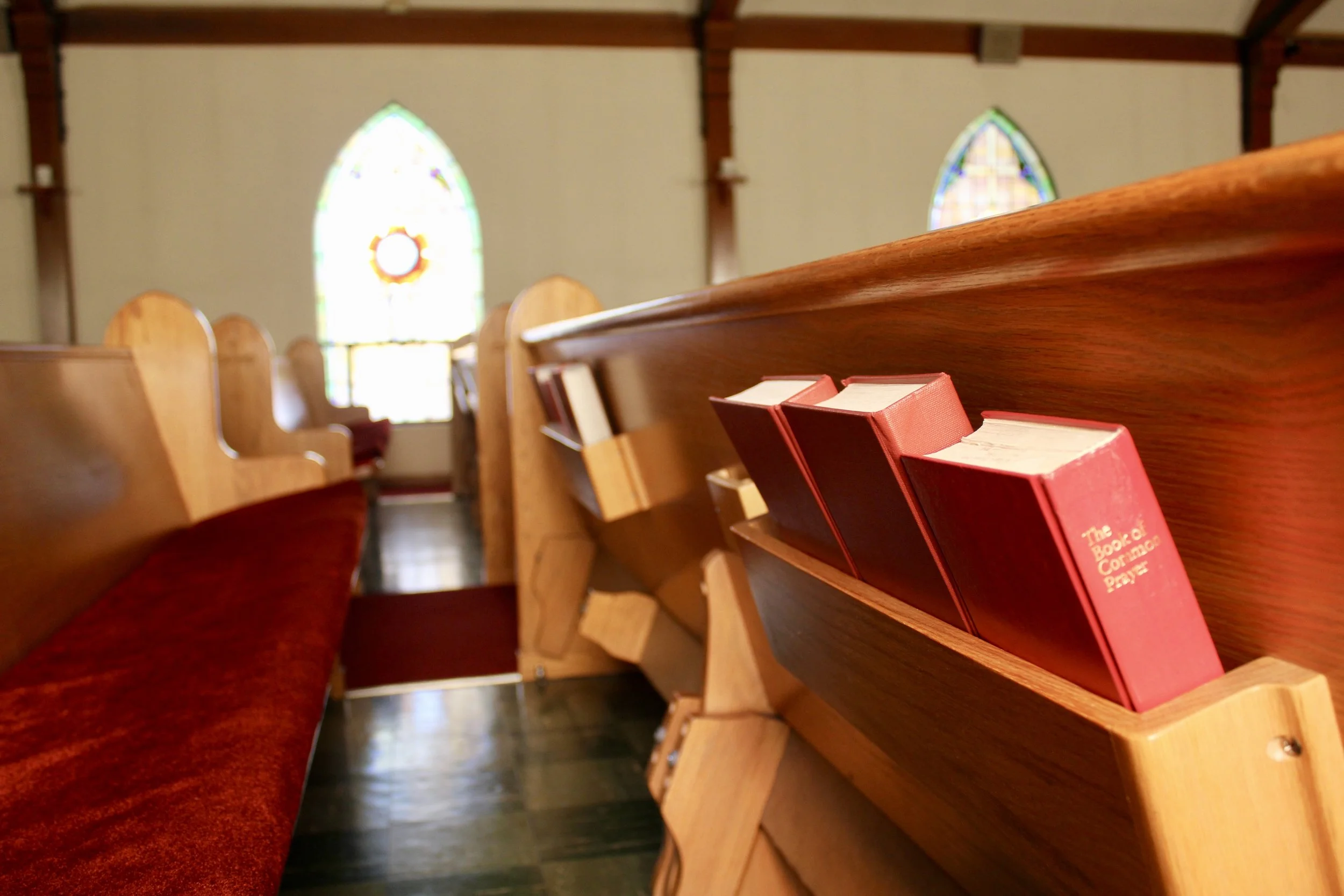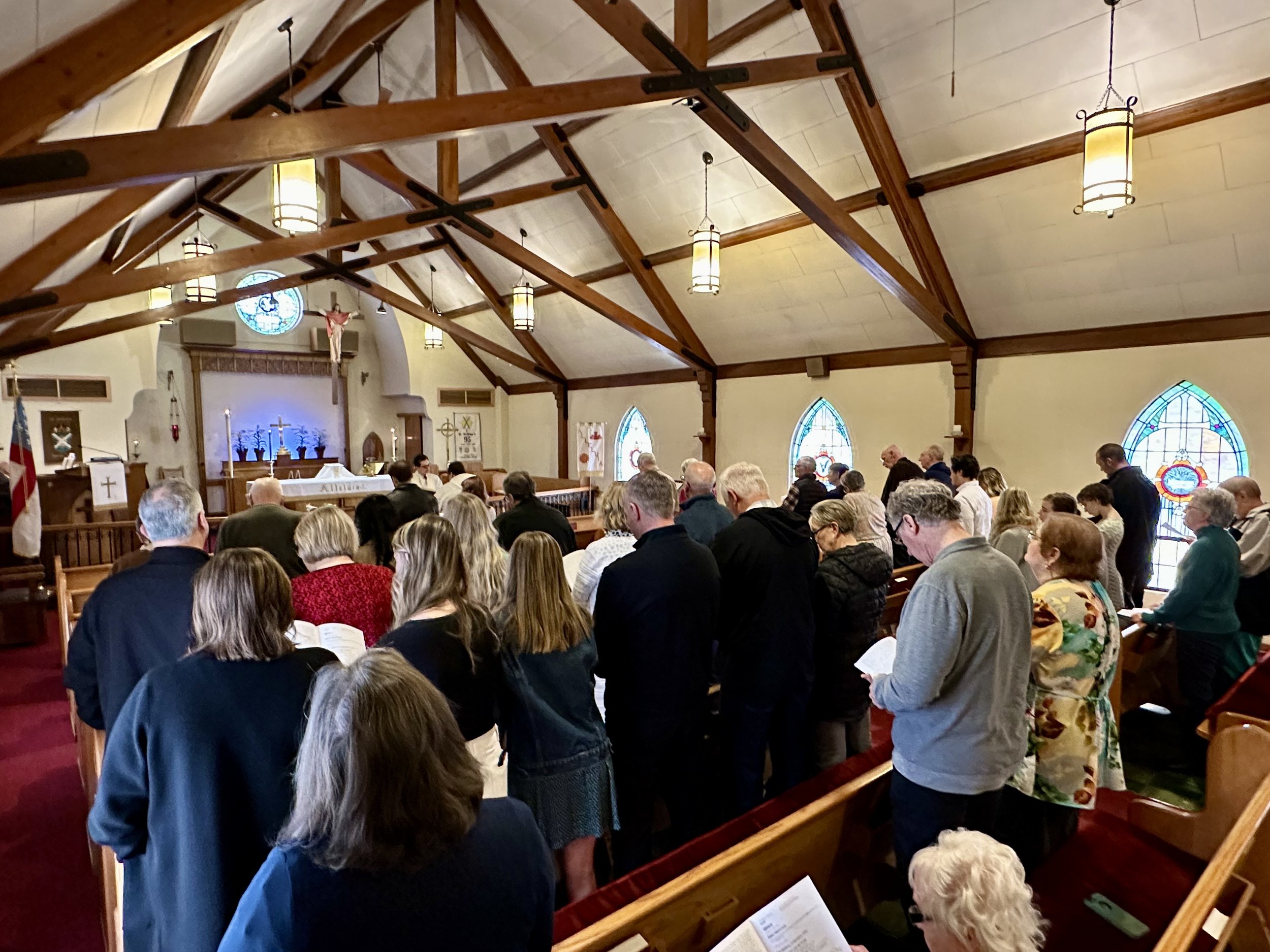What to Expect
It can be nerve racking to set foot in a new church for the first time, especially a humble, intimate one like St. Andrew’s. Don’t worry — all who enter our bright red doors on a Sunday morning are warmly welcomed and treated with respect, regardless of race, gender, sexuality, politics, income, or beliefs. Our members are old-timers and newcomers alike, LGBT and straight, single and married, progressive and conservative, old and young, committed Christians and journeying seekers. Whoever you are, wherever you are on your journey, you are welcome in this place.
Regular Services
Every Sunday morning
9:30 a.m. Eucharist with music
The service is available streaming on our Facebook page every Sunday morning! Join us in the Guild Room after the service for coffee hour and wonderful conversation! We especially invite newcomers and visitors to join us after the service for fellowship. All are welcome!
Information on special occasions and service times — such as Easter, Christmas, weddings, funerals, or other feast days — will be posted on this website or on our Facebook page.
Virtual Morning Prayer is held weekday morning at 9:00 am on Zoom. The Zoom link can be found on the front page of our website.
TIMELESS, NOURISHING RITUALS
St. Andrew’s, like many Episcopal churches across the world, is a liturgical church. This means we practice ancient, timeless rituals that have been passed down, preserved and continually renewed from generation to generation since the early church. To the modern world, these practices may seem quaint or antiquated, but to us, they connect us to the sacred. They help unite us with our spiritual ancestors, reflect on our daily lives, and focus on what truly matters in life.
JOINING IN
Episcopalians practice community-based common prayer, despite our often diverse understandings and beliefs. This means the service is participatory. At times, everyone stands, kneels, sings, or prays together. Even if you are new to our church or uncertain of your beliefs, we invite you to give it a try! Many of us have found that “praying shapes believing.” In other words, practicing the communal reciting of ancient prayers can lead us to new insights, understandings, and ways of seeing. That being said, if at any point you feel uncomfortable, don’t worry! You are welcome to participate in whatever way you feel comfortable, including by simply sitting silently in the pews and taking it all in.
To follow along, be sure to pick up a service bulletin in the entrance to the sanctuary (“narthex”) from one of our greeters (“ushers”). The bulletin contains most of the service in writing, and will tell you when to sit or stand, and when to speak or just listen. In each pew, you’ll find the Book of Common Prayer and the Hymnal. If you need to use either during the service, you will be directed to the correct page. The congregation says the bolded parts of the bulletin text together.
MUSIC
At our 9:30 a.m. service as well as many special occasions or feast days, the congregation sings several hymns together, which are either printed in your bulletin or found in the Hymnal. The Hymnal is organized numerically by tune number and contains over 700 songs, including many all time greats such as “Amazing Grace” (#671), “Be Thou My Vision” (#488), and “Lift Every Voice And Sing” (#599).
We primarily use an organ for singing hymns, which gives sacred music at St. Andrew’s a classic, soul-stirring sound. Occasionally we use the piano or host guest musicians. What we lack in technical singing skill, we make up for in joyful effort and widespread participation! We find that those who take a leap of faith and just sing — regardless of ability — often end up really enjoying it! The tunes are simple and relatively easy to pick up by following the organist’s cues. If you’re more comfortable just listening or humming, that’s perfectly acceptable too.
What To Wear
Come as you are. Some of us dress up, while others feel more at home in casual attire. What matters to us is who you are, not how you look.
The SERVICE
Taking Your Seat - There are no assigned seats! Any pew that feels comfortable is probably the right one. The organ prelude means the service is about to start.
Announcements - The priest or leader will share events for the upcoming week. Congregation leaders or members may also share information about volunteer opportunities, Bible study, book group, or other gatherings.
Procession - When the bell is rung, everyone stands as the Gospel book and cross are carried up the aisle, toward the altar and the processional hymn is sung.
Prayers - The priest leads the congregation in several prayers, some known as “collects.” Some are said by the congregation together, some only by the priest. You can follow along in the bulletin.
Readings - Scriptural passages are read aloud. The readings typically include a passage from the Old Testament, a psalm (sometimes said together or “responsively”), an ancient letter (“epistle”), and a Gospel reading. These ancient writings express the content and wisdom of our faith tradition. When the Gospel is read, we all stand and face the reader out of reverence.
We don’t “cherry pick” Bible verses to suit our desired message for the day. Rather, we follow the lectionary, a church-wide calendar of scriptural passages. On any given Sunday, most Episcopal churches around the world will read the same passages. Hearing scripture comprehensively in this way helps guard against “selective” readings and biblical interpretations.
Sermon - The preacher offers analysis, insight, and historical context to help us understand the scriptural message. The sermon explores the text in depth, takes approximately 10 to 15 minutes and helps us learn how to apply the Way of Love and follow Christ in our daily lives and community.
Creed - We say the Nicene Creed together, an ancient statement of faith first adopted by early Christians in the year 325. This “confession” reminds us of the historic faith of the early church’s fathers and mothers, and helps anchor us as we approach today’s challenges.
Prayers of the People - Led by participants, these include prayers for justice and peace, remembrance for loved ones departed, and comfort for those in need or trouble. Follow along in the bulletin, and if you’re asked to read a prayer by an usher, you’ll do great! Anyone in need of a prayer can be added to the prayer list by contacting Doris Brown or office@standrewsspokane.org.
Confession - We read a prayer together in which we jointly confess our sins against God and our neighbors. Most people kneel by putting down the padded kneelers in the pews. The confession is a moment to reflect on the ways we have fallen short over the past week, and to resolve how we might walk a different path in the coming days.
Passing the Peace - When we hear “May the peace of the Lord be always with you,” we respond with a joyful, “And also with you!” Congregation members then greet each other, often by sharing a sign of peace with each other and saying, “Peace be with you.” The Peace is a transition point in the service between the Liturgy of the Word (readings and sermon), to the Liturgy of the Table (bread and wine).
Offertory - While the priest and lay minister prepare the holy meal, we sing an offertory hymn. We are not currently circulating a collection plate, but instead provide an offertory box that is located in the narthex for those who wish to contribute to support the ministry and mission of the church. There are many ways to give to the church if you are interested, including by mailing contributions to 2404 N. Howard Street, dropping them off in the office, or donating online through our website. Offering financial donations to St. Andrew’s is personal choice and is never a requirement to participate in worship. All are welcome in church, regardless of financial ability.
Eucharist
The eucharist — or communion — is our shared, sacred community meal, and the heart of our worship service. It is our joint act of remembering Jesus, who told his disciples at the Last Supper: “Do this for the remembrance of me.” The term “eucharist” is from the Greek word for “thanksgiving.”
Before the meal, the presider says: “Wherever you are on your journey of faith, you are welcome at this table.” We believe that the table does not belong to us, it belongs to God - participation is available regardless of age or denomination.
Congregants proceed to the altar, releasing themselves by pew, and kneeling or standing at the railing just below the altar. The priest or assisting ministers will offer bread, then wine. They may say, “The body of Christ, the bread of life,” or, “The blood of Christ, the cup of salvation.” It is typical to respond, “Amen,” with hands outstretched to receive the sacrament. Wine is available from the common cup, or an individual serving cup. Please indicate your preference to the minister when you approach.
You may also come forward and cross your arms to simply receive a blessing, instead of the bread and wine. If you do not wish to receive communion, you are welcome to remain seated and not come forward at all. You can learn more about eucharist in the Episcopal Church here.
Learning MOre
If you have a question, you are always welcome to ask the usher, or any of our members. There is a signup sheet in the narthex where you can leave your email address or phone number if you’d like someone to reach out. Or, reach out on our website by clicking on “Find Us.” We would love to connect with you, get to know you better, and answer any questions you may have about St. Andrew’s, worship, or our faith community - which just celebrated its 95th Anniversary!






